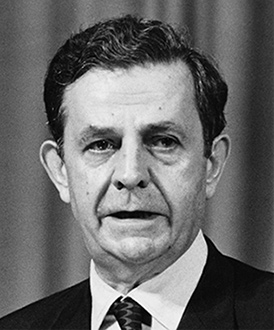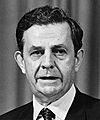Pierre-Paul Schweitzer facts for kids
Quick facts for kids
Pierre-Paul Schweitzer
|
|
|---|---|
 |
|
| Managing Director of the International Monetary Fund |
|
| In office 1 September 1963 – 31 August 1973 |
|
| Preceded by | Per Jacobsson |
| Succeeded by | Johan Witteveen |
| Personal details | |
| Born | 29 May 1912 Strasbourg, Alsace-Lorraine, German Empire |
| Died | 2 January 1994 (aged 81) Geneva, Switzerland |
| Nationality | French |
| Children | Louis Schweitzer |
| Alma mater | University of Paris Sciences Po |
| Profession | Lawyer |
Pierre-Paul Schweitzer (French pronunciation: [pjɛʁpol ʃwɛtse]; 29 May 1912 – 2 January 1994) was a French businessman. He served as the fourth managing director of the International Monetary Fund (IMF) from 1963 to 1973. The IMF is an important organization that works to keep the world's money system stable.
Contents
Early Life and Education
Pierre-Paul Schweitzer was born on May 29, 1912, in Strasbourg. At that time, Strasbourg was part of the German Empire. His son, Louis Schweitzer, later became the CEO of the car company Renault. Pierre-Paul was also the nephew of the famous doctor and Nobel Peace Prize winner, Albert Schweitzer.
Pierre-Paul Schweitzer studied at several universities in France. He went to the University of Strasbourg, the University of Paris, and the Paris School of Political Science (Sciences Po). He earned degrees in law, economics, and political science. This education helped him prepare for his important career.
Career Highlights
Schweitzer started his career working for the French government in 1936. He held many important roles related to finance. He worked with the French Treasury and represented France at the IMF. He also served as a financial expert at the French embassy in Washington.
From 1953 to 1960, he was the director of the French Treasury. This is a very important job, managing the country's money. Later, in 1960, he became a deputy governor of the Bank of France. He also served on the boards of major companies like Air France.
Leading the IMF
On September 1, 1963, Schweitzer became the managing director and chairman of the executive board of the IMF. He was chosen for a second five-year term in 1968.
His time as the IMF's leader was very important for the world's money system. During his leadership, a new international money called "special drawing rights" (SDR) was created. This helped countries manage their money better. The IMF also grew a lot, with its membership increasing from 91 to 125 countries.
Schweitzer received many awards for his work. These included the Commander of the Légion d'Honneur, which is a very high honor in France. He also received the Médaille de la Résistance and the Croix de Guerre for his actions during World War II. In 1972, he was elected to the American Philosophical Society.
Pierre-Paul Schweitzer passed away on January 2, 1994, in Geneva, Switzerland.
Military Service and Resistance
When World War II began, Schweitzer joined the French Army as a lieutenant. After France was taken over in 1940, he joined the French Resistance. This was a secret group that fought against the occupation.
He was later captured and held in a camp called Buchenwald concentration camp in Germany. He survived this difficult time and was freed in 1945.
Images for kids
 | George Robert Carruthers |
 | Patricia Bath |
 | Jan Ernst Matzeliger |
 | Alexander Miles |


